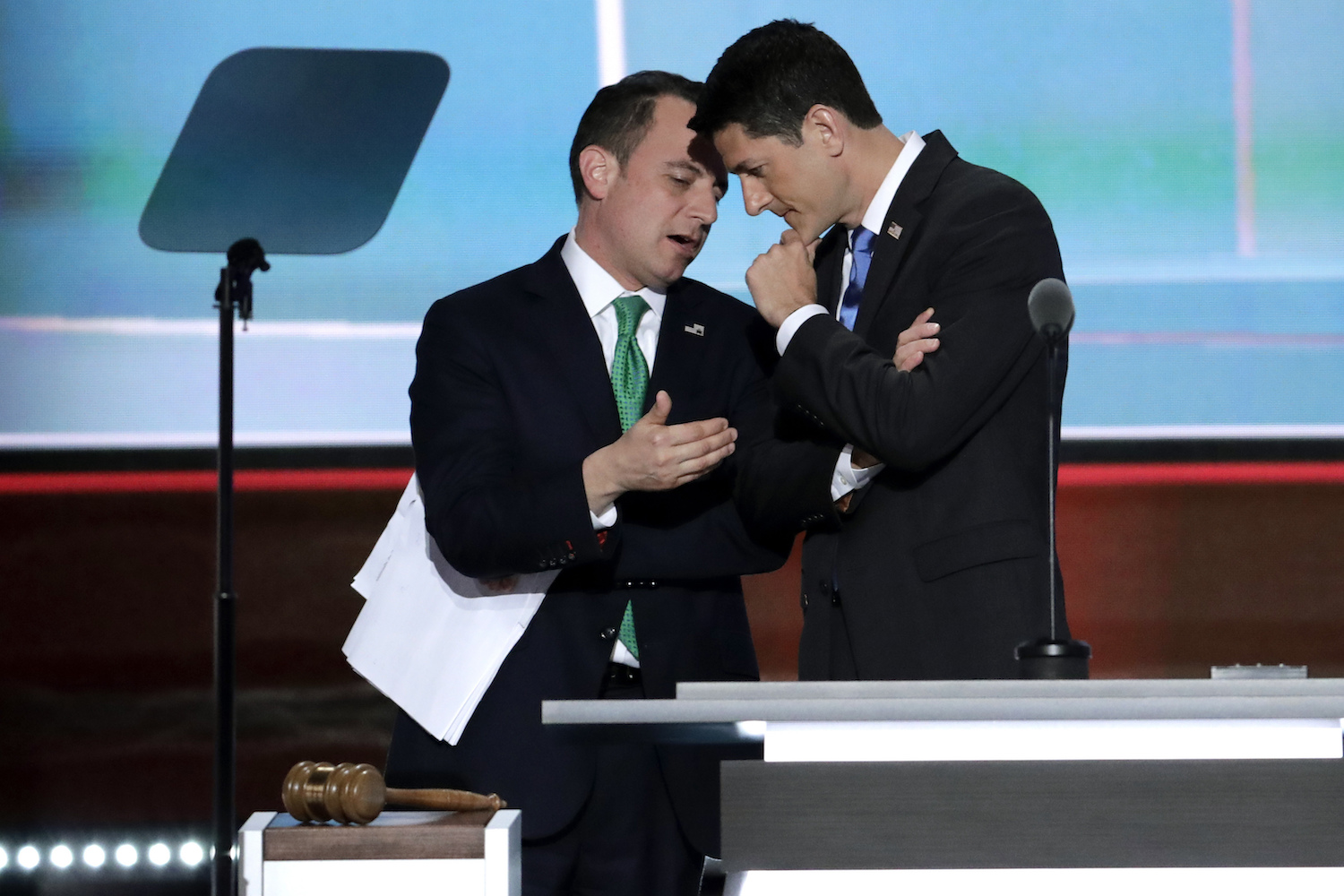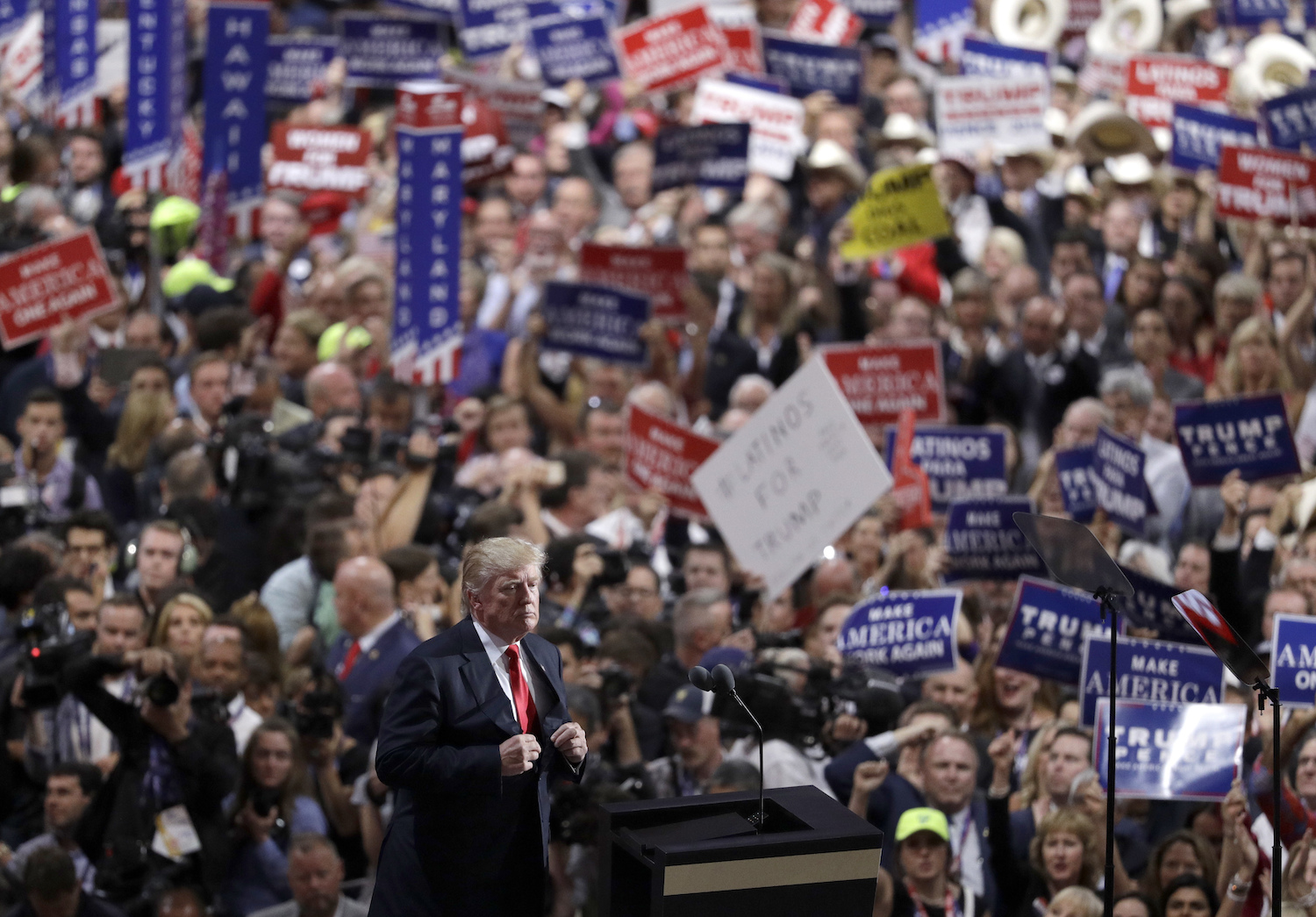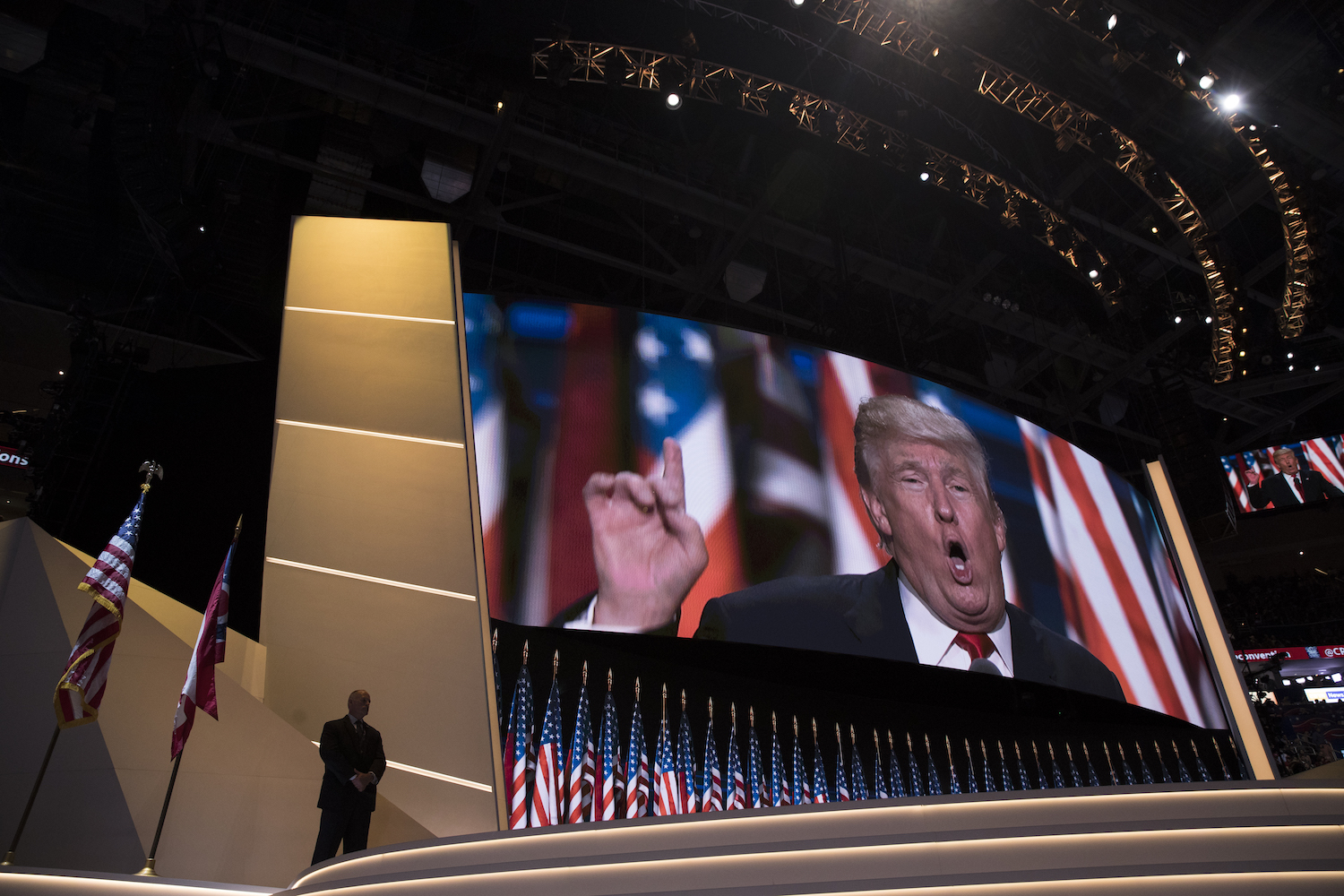CLEVELAND — Donald Trump’s opponents wanted the Republican National Convention to be more like the conventions of old, where the delegates would decide.
His supporters maintained that the primary voters had already made their choice and the convention should remain an extended television commercial for the nominee, as it has been for most of the past 40 years.
Trump won. As a bona fide reality TV star and media celebrity, few nominees came better prepared to lead a week-long infomercial. But presenting a united front at this convention, much less a coherent sales pitch, tested even a self-promoter as skilled as Trump.
The New York businessman became the nominee by defeating 16 other Republicans, including the son and brother of the last two GOP presidents, in an extraordinarily contentious primary process even by the low standards of contemporary politics.
In the courts and at the convention, delegates fought to be unbound so they could vote against Trump. The convention opened with the leadership quashing a drive for a roll call vote on the rules, spearheaded mostly by anti-Trump delegates.
“I have never in all my life, certainly in six years in the United States Senate, prior to that as a lifelong Republican, never seen anything like this,” the normally mild-mannered Utah Sen. Mike Lee fumed to reporters on the convention floor. “There is no precedent for this in parliamentary procedure … We are now in uncharted territory.”
The convention still allowed the most votes recorded against the nominee in 40 years. A defeated primary candidate with no intention of endorsing the nominee was not only allowed to speak, but was given a prominent slot.

There was tension between the familiar free-market conservatism of Republicans like convention chairman House Speaker Paul Ryan and the newer nationalism and populism espoused by Trump and his supporters like RNC Chairman Reince Priebus. (AP Photo)
There was also tension between the familiar free-market conservatism of Republicans like convention chairman House Speaker Paul Ryan and the newer nationalism and populism espoused by Trump.
“We believe in making government, as Ronald Reagan said, not the distributor of gifts and privilege, but once again the protector of our liberties,” Ryan said in his convention address.
“Let the other party go on making the case for more government control over every aspect of our lives — more taxes to pay, more debt to carry, more rules to follow, more judges who just make it up as they go along.”
By contrast, Republican National Committee Chairman Reince Priebus said at the same convention, “Donald Trump wants to make sure you can pay the mortgage, put gas in the car and buy new clothes for the first day of school.”
“I have a different vision for our workers,” Trump declared in his acceptance speech. “It begins with a new, fair trade policy that protects our jobs and stands up to countries that cheat. It’s been a signature message of my campaign from day one, and it will be a signature feature of my presidency from the moment I take the oath of office.”
A lot of Republican leaders are comfortable speaking Ryan’s language, but not Trump’s. At times, it was like two parallel conventions were going on at once.
When Republicans like Senate Majority Leader Mitch McConnell and Wisconsin Gov. Scott Walker spoke to support their nominee at the convention, they were heavy with criticisms of Clinton but short on specifics about Trump.
As a result, much of the convention seemed aimed at serving a right-leaning audience red meat.
The parents who lost children to illegal immigrant murderers or in the assault on the American consulate in Benghazi, Libya, the family members of the border patrol agent whose death is central to the Operation Fast and Furious scandal, the chants of “lock her up,” were all more likely to connect emotionally with the existing Republican base than swing voters.

Republicans were heavy with criticisms of Clinton but short on specifics about Trump, resulting in much of the convention seeming to aim at serving a right-leaning audience red meat. (AP Photo)
The latter was mostly targeted using testimonials intended to humanize Trump that were warm but often lacking in specifics.
“The best part about this convention is the consistent disconnect between standard-issue GOP rhetoric and the stated beliefs of the nominee,” wrote the Atlantic’s David Frum. This is why long-forgotten actors like Scott Baio and Antonio Sabato, Jr. were more energetic than the parade of elected officials on the rostrum.
The Trump children — Donald Jr., Ivanka, Eric and Tiffany — all gave well-received speeches, and there were appearances by motivational speakers, prosperity gospel preachers and tech entrepreneur Peter Thiel.
“Fake culture wars only distract us from our economic decline,” said Thiel, who spoke about being gay in his convention speech. “And nobody in this race is being honest about it except Donald Trump.” Trump praised his audience for cheering his commitment to defending the LGBTQ community.
It highlights the difficulty of winning as a party outsider and then bringing the old coalition back together. But there were some longtime Republicans willing to make a more proactive case for Trump, including some who might think the culture wars are real, while others were brought in who would reinforce the nominee’s message.
“I will be voting for Donald Trump in November,” said Family Research Council President Tony Perkins, a key social conservative leader, in his speech to the convention. “And I urge my fellow Americans to do the same.”
“We are the only country in the world whose immigration system puts the needs of others above our own citizens,” said Maricopa County, Ariz., Sheriff Joe Arpaio, a crusader against illegal immigration arguably even more controversial than Trump himself, speaking at the beginning of primetime on the final night of the convention.
“Donald Trump will build the wall” on the Mexican border, he added, prompting chants of, “Build the wall! Build the wall!”

“The most important difference between our plan and that of our opponents is that our plan will put America first,” Trump told the delegates, reiterating his central campaign argument. (AP Photo)
“I think the party is changing for the better,” Idaho Trump delegate Jennifer Locke told the Washington Examiner. A former supporter of Ron and Rand Paul, Locke said she was attracted to Trump’s rejection of recent Republican foreign policy and desire to put the national interest first.
“We are not going to get an ideologue elected president of this country at this point,” said Locke, praising Trump for being able to get things done.
This is a central Trump argument. “The most important difference between our plan and that of our opponents is that our plan will put America first,” he told the delegates. “Americanism, not globalism, will be our credo.” Some chanted, “America first!”
Trump rails against the North American Free Trade Agreement, which was enacted under President Bill Clinton — with overwhelming support. He talks about turning “our bad trade agreements into great trade agreements.” He talks about tariffs against countries that cheat, a policy many Republicans oppose.
I am not going to let companies move to other countries, firing their employees along the way, without consequences,” he thundered in Cleveland.
Not everyone likes the change. “It is hard to be a Republican right now,” a delegate pledged to another candidate told the Examiner.
To this person, Ted Cruz’s non-endorsement was a rallying cry, albeit one that got him scolded even by members of his own state’s delegation. They complain about Trump’s character, commitment to conservatism, attention to policy details and quicker resort to government power.
Regardless, Trump is now the nominee and will have his opportunity to see how his brand of Republicanism will perform in a general election against Hillary Clinton.
Mike Lee is right. Republicans are in uncharted territory.
